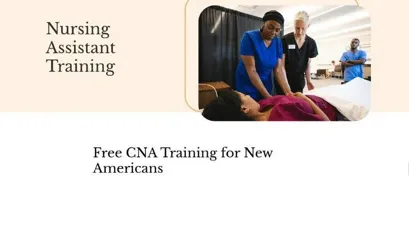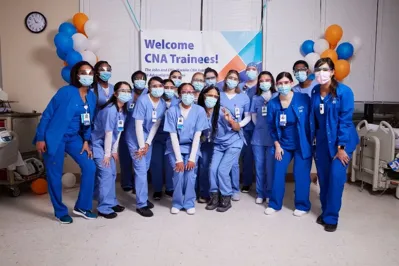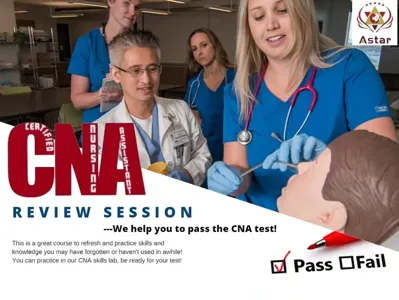In the U.S., some state nursing boards offer free or low-cost CNA (Certified Nursing Assistant) courses that can be completed in as little as 20 days. This provides a valuable opportunity for individuals who wish to enter the healthcare industry quickly and efficiently. This article will explore how to seize this opportunity and detail the process.
![]()
Why Choose a CNA Course?
CNA certification is a foundational qualification for entering the healthcare industry. With a CNA certificate, you can work as a nursing assistant in hospitals, nursing homes, rehabilitation centers, and other healthcare facilities. As an essential part of the medical team, CNAs help patients with daily activities such as bathing, dressing, eating, and mobility, while also assisting nurses with basic medical care.
Compared to other nursing professions, CNA courses require a shorter study period and offer excellent employment prospects, making them particularly suitable for those who want to quickly enter the healthcare field and gain practical experience.
How to Find Free CNA Courses?
In the U.S., some state nursing boards, community colleges, healthcare institutions, and non-profit organizations offer free or subsidized CNA courses. These programs are often government- or employer-funded to meet the growing demand for qualified nursing personnel in the healthcare industry.
1.State Nursing Boards: Many state nursing boards provide certified CNA courses. Some states offer free training through grants or collaborative projects, especially for low-income individuals or specific groups. Visit your state nursing board’s official website to find information about free courses.
2.Healthcare Institutions: Hospitals, nursing homes, and rehabilitation centers sometimes offer free CNA courses. After completing the course and passing the exam, participants are often required to work for the institution for a certain period as part of the agreement.
3.Community Resources: Non-profit organizations and job centers may offer free or low-cost CNA courses and assist students with internship opportunities and career support.
4.Online Resources: While entirely free online CNA courses are rare, some programs offer a hybrid learning model where theoretical components are completed online and practical training is conducted at local healthcare facilities. This approach can also reduce costs.
![]()
Course Structure and Content
CNA courses are designed to help students master basic nursing skills and pass the national certification exam. Despite being only 20 days long, the course content is comprehensive and includes the following aspects:
1.Basic Nursing Skills: Learn how to assist patients with daily activities such as bathing, eating, and mobility.
2.Infection Control: Understand how to prevent the spread of infections to ensure the safety of both patients and caregivers.
3.Patient Safety: Learn how to correctly transfer patients and respond to emergencies.
4.Medical Records: Learn how to document patient information and communicate effectively with the nursing team.
5.Laws and Ethics: Understand the legal responsibilities and professional ethics of nursing assistants.
6.Clinical Practice: The final phase of the course usually includes hands-on training in a healthcare facility, enabling students to apply theoretical knowledge in real-world settings.
Course Structure and Content
CNA courses are designed to help students master basic nursing skills and pass the national certification exam. Despite being only 20 days long, the course content is comprehensive and includes the following aspects:
1.Basic Nursing Skills: Learn how to assist patients with daily activities such as bathing, eating, and mobility.
2.Infection Control: Understand how to prevent the spread of infections to ensure the safety of both patients and caregivers.
3.Patient Safety: Learn how to correctly transfer patients and respond to emergencies.
4.Medical Records: Learn how to document patient information and communicate effectively with the nursing team.
5.Laws and Ethics: Understand the legal responsibilities and professional ethics of nursing assistants.
6.Clinical Practice: The final phase of the course usually includes hands-on training in a healthcare facility, enabling students to apply theoretical knowledge in real-world settings.
Advantages and Career Prospects
1.Short Duration, Quick Results: Complete the course and earn a certificate within 20 days, making it ideal for those who need to find employment quickly.
2.Broad Job Opportunities: With a CNA certificate, you can work in hospitals, nursing homes, home care services, and other healthcare settings. The starting pay is typically $15-20 per hour, with higher rates in some regions.
3.Career Growth Potential: CNA certification is the first step toward higher nursing roles. Many individuals gain experience as CNAs before advancing to become Registered Nurses (RNs) or Licensed Practical Nurses (LPNs).
![]()
Summary
In the U.S., free CNA certification courses provided by nursing boards can open the door to a rewarding healthcare career in just 20 days. This fast and efficient learning pathway lowers the barriers to entering the medical field and offers an ideal option for those looking to change careers or find employment quickly. If you’re interested in becoming a nursing assistant, start searching for a free program that suits your needs and take the first step toward a promising career in healthcare!


